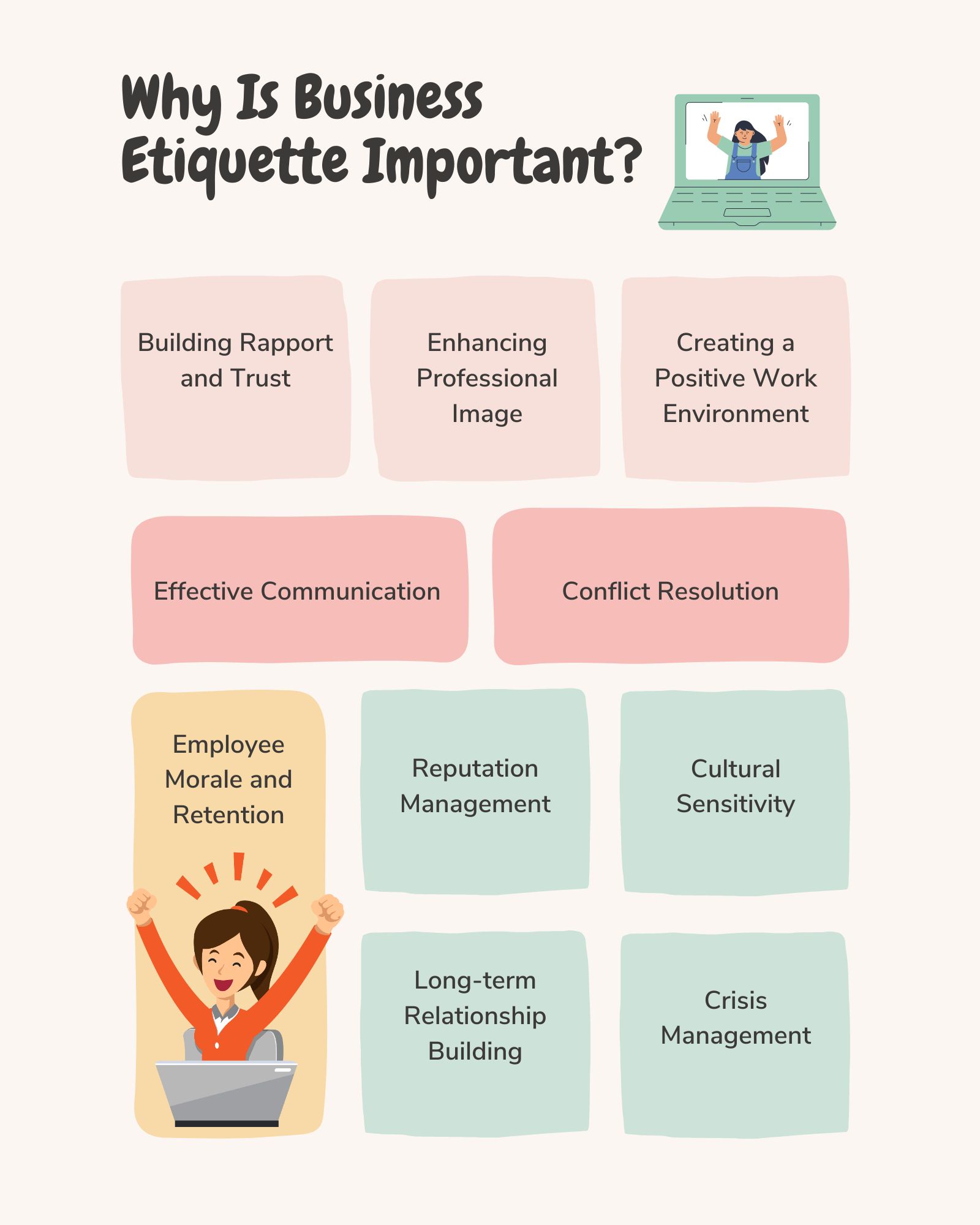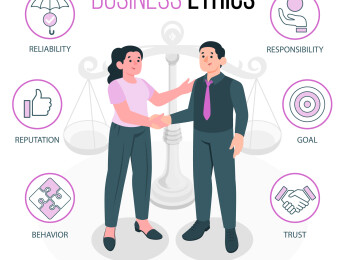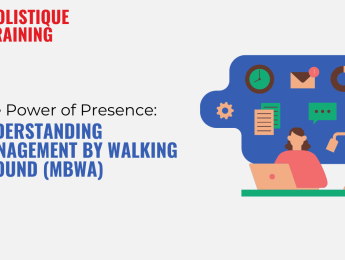- Table of Contents
- Introduction
- What Is Business Etiquette?
- Why Is Business Etiquette Important?
- Building Rapport and Trust
- Enhancing Professional Image
- Creating a Positive Work Environment
- Effective Communication
- Conflict Resolution
- Cultural Sensitivity
- Employee Morale and Retention
- Reputation Management
- Long-term Relationship Building
- Crisis Management
- 15 Tips for Mastering Business Etiquette and Protocol
- 1. Dress Appropriately:
- 2. Punctuality:
- 3. Polite and Clear Communication:
- 4. Active Listening:
- 5. Networking Skills:
- 6. Email Etiquette:
- 7. Respect Personal Space:
- 8. Dining Etiquette:
- 9. Phone Etiquette:
- 10. Meeting Etiquette:
- 11. Cultural Sensitivity:
- 12. Confidentiality and Privacy:
- 13. Business Card Exchange:
- 14. Handling Conflict:
- 15. Gratitude and Appreciation:
- The Impact of Technology on Business Etiquette
- Email Etiquette
- Video Conferencing and Virtual Meetings
- Social Media and Online Presence
- Texting and Instant Messaging
- Privacy and Data Security
- Remote Work and Flexibility
- Dependence on Virtual Communication
- Business Etiquette in International Settings
- 1. Greeting Customs:
- 2. Gift Giving:
- 3. Language and Communication:
- 4. Cultural Norms and Taboos:
- 5. Negotiation Styles:
- 6. Time Sensitivity:
- 7. Hierarchical Structures:
- The Evolution of Gender and Diversity in Business Etiquette
- Pronoun Usage
- Dress Codes
- Accessibility
- Conclusion
Introduction
In today's highly competitive business world, success isn't solely determined by technical skills or qualifications. Your ability to navigate social interactions and present yourself professionally is equally crucial. This is where business etiquette and protocol come into play. This comprehensive guide will explore what business etiquette entails and why it is important. We will also provide you with 15 practical tips to help you master it. Business etiquette is more than just a set of rules; it's the foundation upon which professional relationships are built and sustained.
What Is Business Etiquette?
Business etiquette is the foundation of professional conduct in the corporate world. It comprises a set of behavioural norms and guidelines that govern how individuals interact and communicate in a business environment. At its core, business etiquette is about demonstrating respect, courtesy, and professionalism in all aspects of work-related interactions.
Adhering to business etiquette is pivotal in the complex web of business relationships, whether with colleagues, clients, superiors, or partners. It encompasses many practices, from communicating and dressing to conducting yourself in meetings, networking events, and even dining situations. Essentially, the unwritten code of conduct shapes how individuals are expected to behave in professional settings, reflecting the values and standards of the business world.
Understanding and practising business etiquette fosters harmonious workplace dynamics, helps build trust, enhances credibility, and opens doors to career opportunities. It's not just about following rules; it's about creating an environment where professionalism, respect, and effective communication are valued, ultimately contributing to individual and collective success in the competitive realm of business.
Why Is Business Etiquette Important?
In the fast-paced and interconnected world of business, mastering the art of business etiquette is of paramount importance. Most people agree on its vitality, 79.9% to be specific, and suggest that it should be taught to business students. Let us explore several compelling reasons why adhering to proper conduct and etiquette can significantly impact your professional success and enhance your career prospects:

Building Rapport and Trust
Business etiquette is the cornerstone for establishing and nurturing positive connections with colleagues, clients, and superiors. It fosters an atmosphere of respect and courtesy, creating a conducive environment for building trust and collaboration. When individuals consistently display good manners, attentiveness, and consideration, it strengthens the bonds of professional relationships. Trust, an essential currency in business, is cultivated through these interactions, often leading to more productive partnerships and successful endeavours.
Enhancing Professional Image
Your professional image is a powerful asset. Demonstrating good manners and appropriate behaviour projects an image of competence, reliability, and professionalism. When you consistently adhere to business etiquette, you signal to others that you take your work seriously and respect the norms of your industry. This positive impression can set you apart in a crowded job market, open doors to new opportunities, and contribute to career advancement. Moreover, it reinforces the idea that you are technically proficient and adept at navigating the intricate social fabric of the business world.
Creating a Positive Work Environment
Respectful and considerate behaviour goes beyond individual interactions; it contributes to a harmonious work atmosphere. A workplace characterised by mutual respect, courtesy, and professionalism fosters teamwork and enhances overall productivity. When colleagues and team members feel valued and appreciated, they are more likely to collaborate effectively, leading to innovative solutions and achieving shared goals. Business etiquette, therefore, plays a pivotal role in shaping the cultural landscape of organisations, making them more conducive to success and growth.
Effective Communication
Effective communication is the lifeblood of any successful business interaction. Business etiquette guides you in using proper language and maintaining a polite tone when speaking or writing emails. It ensures that your messages are clear and concise, reducing the risk of miscommunication. When everyone in a business setting follows similar communication norms, it streamlines information flow, minimises misunderstandings, and contributes to more efficient and productive collaborations.
Conflict Resolution
Conflicts or disagreements are almost inevitable in any professional journey. Business etiquette equips you with the skills to address these issues professionally and tactfully. Instead of escalating conflicts, you learn to focus on finding mutually beneficial solutions. This approach not only preserves relationships but also demonstrates your ability to navigate challenging situations, a valuable skill in the business world.
Cultural Sensitivity
Understanding and respecting cultural differences is crucial in a globalised business landscape. Business etiquette encourages educating yourself about different customs, traditions, and social norms. This knowledge helps you avoid unintentionally causing offence or misunderstanding, making you a more effective collaborator in international business settings. It's not just about avoiding missteps but embracing diversity and leveraging it for mutual success.
Employee Morale and Retention
Fostering a culture of business etiquette can significantly impact employee morale and retention for organisations. Employees who perceive that their workplace values professionalism and respects their contributions are likelier to remain engaged and committed to their roles. High morale often leads to lower turnover rates, reducing the costs associated with recruitment and training. Moreover, a respectful workplace is more attractive to top talent, further enhancing the organisation's competitive edge.
Reputation Management
Your professional reputation is a valuable asset that your behaviour and adherence to business etiquette can influence. In an era of online reviews and social media, word of your professional conduct can spread quickly. Upholding business etiquette safeguards your reputation by ensuring you are perceived as reliable and respectful, even in challenging situations. A positive reputation can open doors to new opportunities and protect you from potential setbacks.
Long-term Relationship Building
Business is often about the long game; building enduring relationships is key to sustained success. Business etiquette emphasises gratitude, appreciation, and acknowledgement of others' efforts. These practices help forge lasting bonds with colleagues, clients, and partners. Long-term relationships are often the foundation of repeat business, referrals, and collaborative ventures that can significantly impact your career trajectory.
Crisis Management
Business etiquette can serve as a stabilising force in times of crisis or high-pressure situations. It guides you in maintaining professionalism, even when faced with adversity. Your ability to handle crises with poise and courtesy can positively impact your reputation and how others perceive your leadership qualities.
Benefit | Description |
Stonger Professional Relationships | Foster trust and collaboration |
Enhanced Professiioonal Image | Project competence and reliability |
Positive Work Environmenet | Promote teamwork and productivity |
Effective Conflict Resolution | Resolve issues tactfully and professionally |
Improves Communication | Clear and respectful interactions |
Long-term Career Advancement | Open doors to oppurtunities |
Table 1: Benefits of Business Etiquettes
15 Tips for Mastering Business Etiquette and Protocol
Now that we understand the significance of business etiquette, let's delve into an expanded set of practical tips and strategies that will empower you to navigate professional interactions with finesse and confidence. These tips cover various aspects of business etiquette, offering a comprehensive guide to succeed in the corporate world:
1. Dress Appropriately
Dressing appropriately is not just about following a dress code; it's about making a positive impression. Your attire should align with the company's culture and the occasion. Ensure your clothing is clean, well-fitted, and reflects professionalism. Pay attention to grooming, as personal hygiene and presentation are crucial to your perception.
2. Punctuality
Being on time is a fundamental aspect of business etiquette. Whether it's for meetings, appointments, or any professional commitment, punctuality demonstrates your respect for others' time and your commitment to the task at hand. Plan your schedule effectively to avoid any last-minute rushes.
3. Polite and Clear Communication
Effective communication is at the heart of business success. Use proper language, maintain a polite tone, and be concise when speaking or writing emails. Avoid jargon that might confuse or alienate others. Ensure your messages are well-structured and free of grammatical errors, and always respond promptly.
4. Active Listening
Listening is as important as speaking. Give your full attention to others when they speak, whether during a meeting or a one-on-one conversation. Avoid interrupting and show genuine interest in what others have to say. Effective listening fosters better understanding and stronger relationships.
5. Networking Skills
Networking is a valuable skill in the business world. Approach networking events with a friendly and open attitude. Initiate conversations, but also be a good listener. Exchange contact information and follow up afterwards to maintain connections. Building a robust professional network can open doors to new opportunities and collaborations.
6. Email Etiquette
Email is a primary mode of business communication. Use a professional and concise tone in your emails. Ensure your messages are well-structured and free of grammatical errors. Always respond promptly to emails, as delays can be perceived as a lack of interest or professionalism.
7. Respect Personal Space
During face-to-face interactions, be mindful of personal space. Respect physical boundaries and avoid invading someone's personal space unless invited to do so. Being aware of personal space shows consideration for others' comfort.
8. Dining Etiquette
Understanding dining etiquette is essential for business meals and events. Familiarise yourself with proper utensil use, table manners, and cultural customs. Be mindful of the pace of the meal, engage in polite conversation, and avoid discussing controversial topics. Your behaviour during business meals reflects your professionalism.
9. Phone Etiquette
Professional phone etiquette is crucial. When answering calls, be courteous and identify yourself professionally. Speak clearly and avoid distractions or background noise. Return calls promptly and keep conversations concise. A professional phone manner is vital for effective communication.
10. Meeting Etiquette
Prepare for meetings by reviewing the agenda and relevant materials beforehand. Arrive on time and actively participate by contributing relevant ideas and opinions. Avoid dominating conversations and be respectful of others' input. In virtual meetings, maintain professionalism by looking directly at the camera, minimising background noise, dressing appropriately, and ensuring all participants have a chance to speak.
11. Cultural Sensitivity
Understanding and respecting cultural differences is paramount in today's globalised business landscape. Statistics show that success is predominantly determined by social skills, accounting for 85% of the equation, while technical skills contribute to the remaining 15%. This is why you need to educate yourself about different customs, traditions, and social norms to avoid misunderstandings or causing unintentional offence. Cultural sensitivity enhances your ability to work effectively with colleagues from diverse backgrounds.
12. Confidentiality and Privacy
Maintaining confidentiality regarding sensitive company or client information is vital. Respect colleagues' privacy by not prying into personal matters unless they willingly share. Trust and discretion are highly valued in professional settings.
13. Business Card Exchange
When exchanging business cards, handle them carefully and show interest in the information provided. Offering your card using both hands is a sign of respect, particularly in some cultures. A well-executed business card exchange can leave a lasting impression and facilitate future communication.
14. Handling Conflict
Conflicts and disagreements are inevitable in the workplace. Business etiquette guides you in addressing these issues professionally and tactfully. Focus on finding solutions rather than placing blame. Active listening and empathy are crucial in resolving conflicts effectively, preserving relationships, and maintaining a positive work environment.
15. Gratitude and Appreciation
Show appreciation for others' efforts and contributions. Whether it's a simple thank-you note, publicly acknowledging achievements, or offering genuine compliments, expressing gratitude fosters a positive work environment and strengthens professional relationships. Recognising and valuing the contributions of others is a hallmark of effective business etiquette.
Incorporating these expanded tips into your professional repertoire will not only help you navigate the complex world of business with grace but also position you for long-term success and growth. Business etiquette is a dynamic skill that evolves with the times, making it a vital aspect of a successful career in today's corporate landscape.
The Impact of Technology on Business Etiquette
In today's digital age, technology has fundamentally transformed the landscape of business etiquette. How we communicate, interact, and conduct ourselves in professional settings has undergone significant changes due to the pervasive influence of technology. Let's explore the multifaceted impact of technology on business etiquette:
Email Etiquette
Email has become the primary mode of professional communication, and its etiquette has evolved alongside its widespread use. Beyond the basics of clear and concise writing, professionals must now navigate the nuances of email tone. Misinterpretation can occur easily, so balancing formality and informality is vital, depending on your workplace culture. Moreover, prompt response expectations have heightened, making timely replies an essential aspect of email etiquette.
Video Conferencing and Virtual Meetings
The rise of video conferencing tools has brought virtual meetings to the forefront and, with them, a new set of etiquette guidelines. Business professionals must now consider factors like camera positioning, background, lighting, and attire. Maintaining eye contact by looking directly into the camera has become a sign of engagement. Background noise, interruptions, and multitasking during virtual meetings can be disruptive and should be avoided.
Social Media and Online Presence
Social media platforms have emerged as powerful tools for networking, personal branding, and professional communication. However, their use comes with its own set of etiquette rules. Maintaining a professional online presence and avoiding posting controversial or offensive content is essential. Engaging in respectful and meaningful conversations and showcasing your expertise can help you build a positive digital reputation.
Texting and Instant Messaging
Texting and instant messaging have become common quick communication methods in professional settings. Business etiquette in texting includes using proper language, being mindful of tone, and respecting others' availability. Understanding when it's appropriate to use texting or instant messaging versus email or phone calls is essential to effective communication.
Privacy and Data Security
The digital age has also heightened concerns about privacy and data security. Proper etiquette includes respecting the confidentiality of sensitive information in electronic communications. Professionals must be vigilant about secure practices, such as using encrypted channels for sensitive conversations and safeguarding access to digital files.
Remote Work and Flexibility
The COVID-19 pandemic accelerated the adoption of remote work and flexible schedules. As a result, the boundaries between personal and professional life have become more porous. Business etiquette now involves respecting colleagues' time zones, flexible working hours, and the need for work-life balance. Communicating effectively while accommodating diverse work arrangements is essential.
Dependence on Virtual Communication
With the increased reliance on virtual communication, the importance of business etiquette in virtual interactions cannot be overstated. This includes being punctual for virtual meetings, dressing professionally even when working from home, and maintaining professionalism in email exchanges.
Business Etiquette in International Settings
Navigating business etiquette internationally is a nuanced and critical skill in today's globalised world. Understanding and respecting cultural differences is essential for effective cross-border communication and collaboration. Let's delve deeper into the complexities and importance of business etiquette in international contexts:
1. Greeting Customs
Different cultures have distinct greeting customs. For instance, in Japan, bowing is a common form of greeting, while in Western countries, a firm handshake is typical. Researching and adapting to the greeting customs of the country or culture you are interacting with is crucial. The appropriate greeting shows respect and sets a positive tone for the business relationship.
Culture | Common Greeting Gesture |
Japan | Bowing |
United States | Firm Handshake |
India | Namaste (Palms together, head nod) |
France | Double Cheek Kiss or Handshake |
China | Slight Bow or Handshake |
Brazil | Hug or Kiss on Both Cheeks |
Saudi Arabia | Handshake (Men) or Nod (Women) |
Russia | Firm Handshake or Kiss on the Cheek |
Table 2: Greeting gestures in different countries around the world
2. Gift Giving
Gift-giving customs vary widely across cultures. In some cultures, exchanging gifts during business meetings is customary; in others, it may be seen as inappropriate or even as a bribe. Understanding the appropriate occasions for gift-giving, the types of acceptable gifts, and any cultural taboos related to gifts is essential. In some cultures, wrapping a gift in a specific colour may hold significance, so attention to detail is vital.
3. Language and Communication
Language barriers can pose significant challenges in international business interactions. Patience and clear, simple language are essential when communicating with non-native English speakers. Consider using professional translation services for important documents to ensure accuracy. Additionally, being aware of the varying nuances of communication, such as indirect vs. direct communication styles, can prevent misunderstandings.
4. Cultural Norms and Taboos
Every culture has its own set of norms and taboos. What is considered polite in one culture may be offensive in another. For example, in some Asian cultures, it's customary to present and receive items with both hands as a sign of respect, while in Western cultures, one hand is typically used. Understanding these cultural norms and avoiding behaviours that may inadvertently offend is crucial for successful international business interactions.
5. Negotiation Styles
Negotiation styles can vary significantly across cultures. Some cultures prioritise building relationships and may engage in lengthy, relationship-focused negotiations. Others may have a more direct and transactional approach. Understanding the negotiation style of your international counterparts can help you adapt your approach to achieve mutually beneficial outcomes.
6. Time Sensitivity
Perceptions of time can vary greatly. Some cultures prioritise punctuality and expect meetings to start precisely on time, while others have a more flexible approach to schedules. Awareness of these cultural differences and adjusting your time management and punctuality accordingly is essential to making a positive impression.
7. Hierarchical Structures
In some cultures, hierarchical structures and titles are significant. Addressing individuals with their appropriate titles and showing deference to senior members of an organisation is a sign of respect. In contrast, addressing colleagues by first name may be the norm in more egalitarian cultures. Understanding the hierarchy and appropriate forms of address is crucial.
The Evolution of Gender and Diversity in Business Etiquette
As workplaces become more diverse and inclusive, business etiquette is evolving to be more sensitive to gender and diversity considerations. Here are some important aspects to consider:
Pronoun Usage
Respecting individuals' preferred pronouns is a fundamental aspect of modern business etiquette. Inclusive language and using the correct pronouns demonstrate respect for gender diversity.
Dress Codes
Many organisations are revising their dress codes to be more inclusive and flexible. This includes allowing employees to dress in a way that aligns with their gender identity and cultural background.
Accessibility
Ensuring that meetings, events, and workplaces are accessible to individuals with disabilities is a legal requirement and a matter of proper etiquette. Considerations include providing accessible venues and materials for all attendees.
Conclusion
Mastering business etiquette and protocol is essential for professional success. Adhering to these principles and guidelines can build strong relationships, project a professional image, and contribute positively to your work environment. Remember, good manners and respect go a long way in the world of business, and adapting to the evolving landscape of etiquette is key to thriving in the modern business world.



























